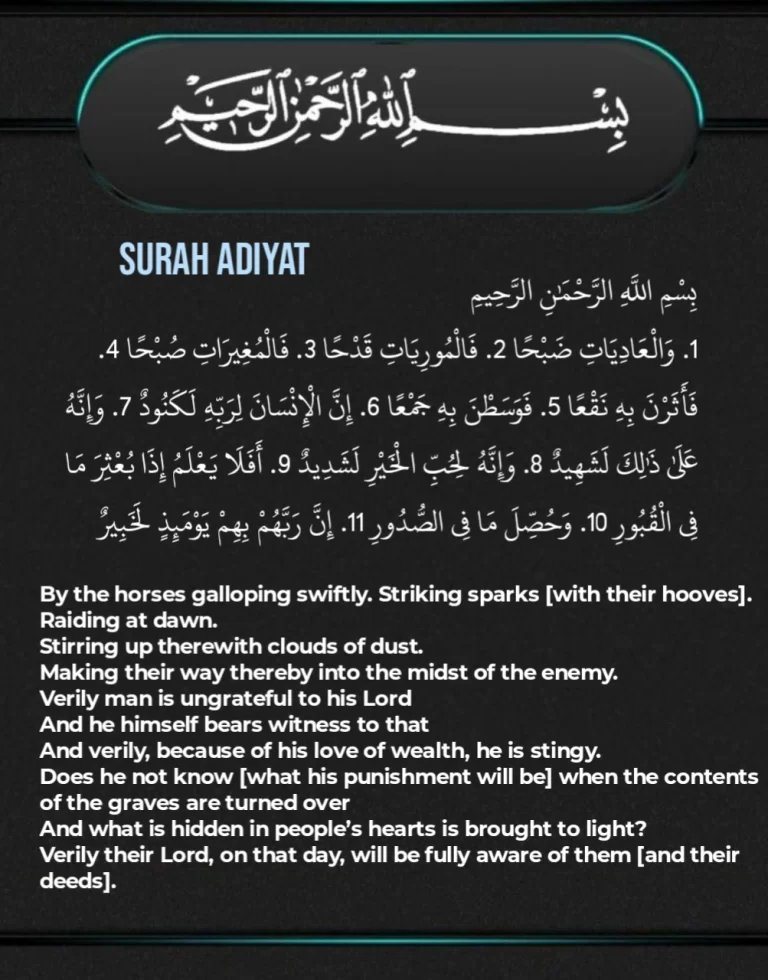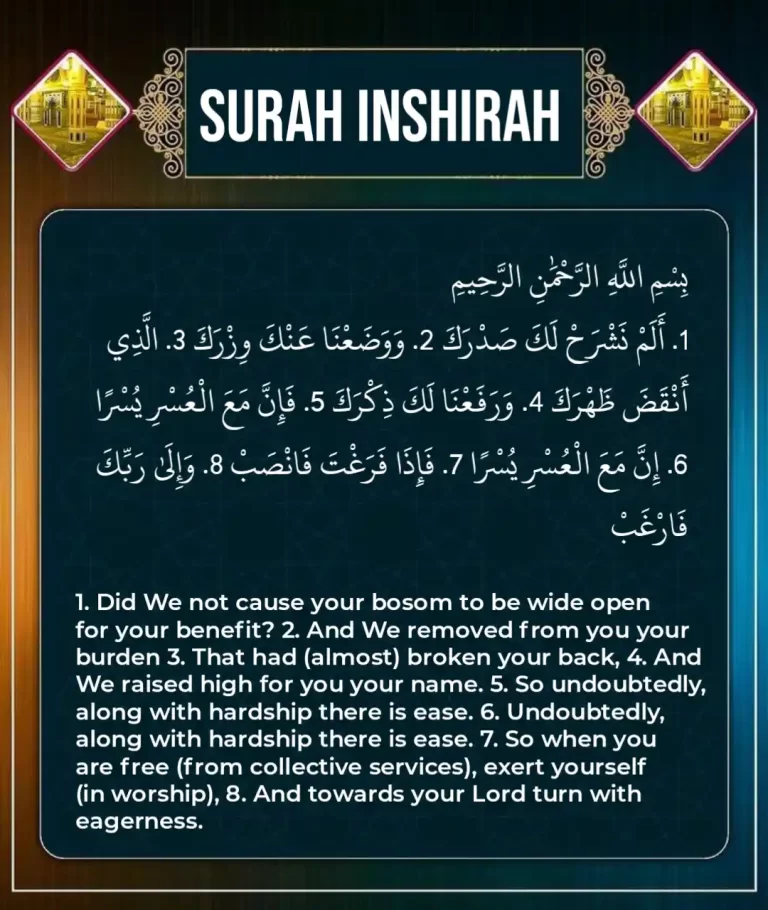Wal Asr Surah In English, Transliteration, and Arabic Text
Surah Al Asr which starts with Wal Asr Surah In English means The Declining Day, Eventide, The Epoch, or the Time.
Advertisements
It is the 103rd chapter of the Qur’an. It contains three or verses. Surat al-Asr is the second shortest chapter after Surah Kausar.
Wal Asr Surah In English Translation
- By Time
- Verily man is in a state of utter loss.
- Except those who believe and do righteous deeds, and exhort one another to hold fast to the truth and exhort one another to be steadfast.
Surah Wal Asr Transliteration
- Wal asr
- Innal insaana lafee khusr
- Il lal lazeena aamanu wa ‘amilus saali haati wa tawa saw bil haqqi wa tawa saw bis sabr.
Surah Wal Asr In Arabic
بِسْمِ ٱللَّهِ ٱلرَّحْمَـٰنِ ٱلرَّحِيمِ
- وَالْعَصْرِ (١)
- إِنَّ الإِنسَانَ لَفِي خُسْرٍ (٢)
- إِلاَّ الَّذِينَ آمَنُوا وَعَمِلُوا الصَّالِحَاتِ وَتَوَاصَوْا بِالْحَقِّ وَتَوَاصَوْا بِالصَّبْرِ (٣)
Summary Wal Asr Surah
| Classification | Makki |
| Number of verses | 3 |
| Postion | 30 juz |
| Order | 103 |
| Names | The declining time, the day |
| Surah Before | Surah Takasur |

Tafsir Of Surah Al Asr In English
This surah is an unparalleled example of comprehensiveness in one sentence.
It declares in a clear and concise way that there is no good in mankind without faith and good deeds and it outlines the complete structure upon which to base an Islamic life.
Advertisements
Al-Imam ash-Shafiʽi stated that if people only reflected well on this surah, it would be sufficient for them.
It was reported by at-Tabarani that when two men among the Sahabah met, they would not part until one of them had recited all of Surah al-ʽAsr to the other before saying as-salamu alaykum.
The first verse means
By time, The surah begins with an oath.
A few commentators have given the meaning of al-ʽasr as the period of late afternoon or the ʽasr prayer.
Advertisements
However, most consider it to be the passing of time throughout the ages.
Allah swears by time, which is one of His creations.
It is a sense of direction instilled in the psychological makeup of man, as he remembers and records what is past, experiences what is present, and feels uncertainty about the future.
Advertisements
It is a valuable commodity granted to man by Allah, and is what gives him the opportunity to procure a good status in the permanent life to come.
But time is elapsing and running out; it will eventually end for both the individual and the entire creation.
The Messenger of Allah (SAW) awakened mankind to the importance of time, encouraging good use of it and instilling in the conscience a sense of responsibility concerning it.
He said,
Take advantage of five things before five:
- Your youth before your old age,
- Your health before your illness,
- Your wealth before your poverty,
- Your free time before your busy time, and
- Your life before your death.
And he (SAW) said,
The best of you is one whose life is long and deeds are good, while the worst of you is one whose life is long and deeds are foul.
Umar bin Abdul Azeez observed,
The night and day are working within you, so work within them.
And al-Hasan al-Basri said,
The world is but three days:
- Yesterday, which has gone with all it contained;
- Tomorrow, in which you may not be present; and
- Today, which is yours, so use it well.
As for the second verse,
Indeed, mankind is in loss, With the exception of those mentioned in the final verse, the whole of mankind is in a state of loss.
One who reflects on the affairs of this world and the transience of earthly existence will observe that every material blessing, every advantage and every ability is lost at death, if not before.
Age decreases one’s remaining lifespan day after day, and each breath brings him further toward its loss.
The Messenger of Allah (SAW) encouraged visiting graves only to remind the living of death and what accompanies it of lost opportunity.
Ibn al-Qayyim said,
Time passes and elapses by essence of its nature, so one who is unaware will find his time gone, his loss great, and his regret intense [at the time of death].
Then how will his condition be when he learns for certain the extent of what he has lost.
Allah (SWT) said, addressing His Messenger (SAW):
Say, “Shall we [believers] inform you of the greatest losers as to [their] deeds? [They are] those whose effort is lost in the worldly life, while they think that they are doing well in work.
People will be in loss to varying degrees.
Some will be partially at loss with few or no good deeds to their credit on the Day of Resurrection.
The self-deluded unbelievers will be entirely at loss, their work being of no avail on that Day.
Allah has warned:
And let not those who reject belief think that because We extend their time it is better for them.
We only extend it for them that they increase in sin, and for them is a painful punishment.
They will be overcome with regret in the next life when they experience the greatest loss.
That of eternal Paradise, which could have been theirs if they had not refused it.
As for the last verse,
Except for those who have believed and done righteous deeds and advised each other to truth and advised each other to patience.
Allah then states the exception to the aforementioned generalization.
It is people who do four things: they believe in what was conveyed by Allah through His final Messenger, Muhammad (SAW)
They do righteous deeds according to teachings of the Qur’an and Sunnah.
They advise one another to adhere to the truth; and they advise one another to endure the trials of this world with patience.
The ayah is explicit in indicating the methods by which humanity can escape that loss.
None but a believer will enter Paradise.
Through his faith, not only will he avoid the greatest loss but also obtain eternal profits and rewards.
Righteous deeds are often mentioned in the Qur’an along with belief, since in fact, deeds are the result of faith.
They may take the form of prescribed acts of worship, of honesty and good conduct, or of assisting others to attain their needs.
There are deeds of the heart, the tongue, and the limbs.
Allah then mentions the mutual encouragement of truth.
This means to cooperate and advise one another to be truthful and to spread the truth of Islam.
It is required between the ruler and ruled, parent and child, youth and elder, teacher and student, husband and wife.
Muslims are responsible within their capacities to enjoin what is right and forbid what is wrong.
When Umar assumed the caliphate he addressed his people, saying,
There is no good in you if you do not speak out and no good in us if we do not listen.
Finally, Allah mentions the mutual encouragement of patience.
These servants of Allah counsel one another to patiently persevere, even during hardships and difficulties.
Faith requires patience; righteous deeds require patience; upholding truth requires patience.
Patience is the basis of nobility and good manners, keeping a person balanced by tempering his thoughts and actions.
Umar said, We obtained the best times of our lives by being patient.
Advertisements








2 Comments